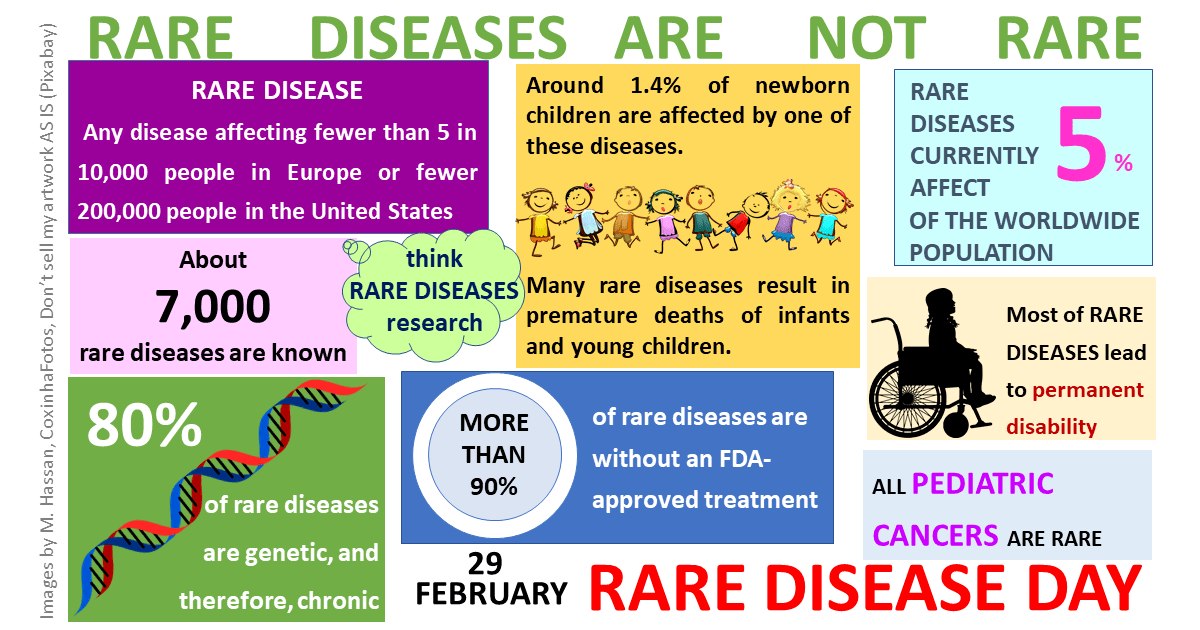Topic Menu
► Topic MenuTopic Editors

2. CIPF-IIS La Fe Joint Unit Rare Diseases, 46012 Valencia, Spain
3. UPV-CIPF Joint Research Unit Disease Mechanisms and Nanomedicine, 46012 Valencia, Spain

2. Unit of Developmental Biology and Disease Models, Centro de Investigación Príncipe Felipe (CIPF), 46012 Valencia, Spain
3. UPV-CIPF Joint Research Unit Disease Mechanisms and Nanomedicine, 46012 Valencia, Spain

2. Unit of Pathophysiology and Therapies for Vision Disorders, Centro de Investigación Príncipe Felipe (CIPF), 46012 Valencia, Spain
3. Center for Biomedical Network Research on Rare Diseases (CIBERER), Instituto de Salud Carlos III (ISCIII), 28029 Madrid, Spain
Rare Diseases Are Not Rare

Topic Information
Dear Colleagues,
In Europe, a rare disease is one that affects fewer than five people per 10,000 of population. Its low casuistry results in a relatively low interest in investing in research into these diseases and the development of therapies. Nevertheless, they exist. More than 7,000 rare diseases are supposed to exist. Most of them are Mendelian disorders, affect children, are congenital and may cause severe disability. They are often chronic and life-threatening. To make things worse, most of them lack an effective treatment. Rare diseases encompass a wide range of conditions, such as movement disorders, metabolic diseases, neurological diseases or retinal dystrophies. In this multidisciplinary topic, we invite you to submit original articles, reviews, or case reports focused on how neurodegeneration is commonly involved in the pathomechanisms of many rare diseases, and the most recent advances that may enable patients to receive an accurate diagnosis, and to achieve a rational treatment.
Dr. Carmen Espinós
Dr. Máximo Ibo Galindo
Dr. Regina Rodrigo
Topic Editors
Keywords
- rare diseases
- genetics
- OMICS
- metabolism
- biomarkers
- drug discovery
- cell therapy
- pharmacological therapy
- neurodegeneration
- neuroprotection
- neurodevelopment
- genomic edition
- clinical trials
Participating Journals
| Journal Name | Impact Factor | CiteScore | Launched Year | First Decision (median) | APC |
|---|---|---|---|---|---|

Antioxidants
|
6.6 | 12.4 | 2012 | 17.4 Days | CHF 2900 |

Biomedicines
|
3.9 | 6.8 | 2013 | 17 Days | CHF 2600 |

International Journal of Molecular Sciences
|
4.9 | 9.0 | 2000 | 20.5 Days | CHF 2900 |

Life
|
3.4 | 6.0 | 2011 | 19.3 Days | CHF 2600 |

NeuroSci
|
2.0 | - | 2020 | 27.1 Days | CHF 1200 |

Preprints.org is a multidisciplinary platform offering a preprint service designed to facilitate the early sharing of your research. It supports and empowers your research journey from the very beginning.
MDPI Topics is collaborating with Preprints.org and has established a direct connection between MDPI journals and the platform. Authors are encouraged to take advantage of this opportunity by posting their preprints at Preprints.org prior to publication:
- Share your research immediately: disseminate your ideas prior to publication and establish priority for your work.
- Safeguard your intellectual contribution: Protect your ideas with a time-stamped preprint that serves as proof of your research timeline.
- Boost visibility and impact: Increase the reach and influence of your research by making it accessible to a global audience.
- Gain early feedback: Receive valuable input and insights from peers before submitting to a journal.
- Ensure broad indexing: Web of Science (Preprint Citation Index), Google Scholar, Crossref, SHARE, PrePubMed, Scilit and Europe PMC.

